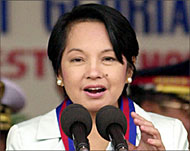Manila peace talks flounder
Talks to end a long-running communist rebellion in the Philippines has run into trouble because the US and its allies continue to treat the rebels as terrorists, a top negotiator said.

National Democratic Front (NDF) negotiator Luis Jalandoni accused President Gloria Arroyo of balking at the rebels’ request to put pressure on Washington and other western allies to drop the insurgents from a blacklist of “foreign terrorist organisations” (FTO).
Manila has argued that the FTO tag, imposed after the 11 September 2001 attacks in the US, has dried up the rebels’ foreign fund sources, reducing the ability of the 8800-member New People’s Army (NPA) to mount attacks on government forces and civilian targets.
The listing has also affected the movements of Jose Maria Sison, the founder of the Communist party of the Philippines (CPP), who lives in self-imposed exile in Utrecht in the Netherlands along with other top rebel leaders.
Rise in extortions
 |
|
Arroyo was hoping to sign a peace |
Officials have said the terrorist listing has forced the CPP-NPA to step up extortion in the Philippines, which has suffered 35-years of Maoist rebellion.
Chief government negotiator Silvestre Bello confirmed that the two sides “found themselves in an impasse” on the first day of the talks held in Norway on Tuesday even before they could start discussing how to speed up the peace process.
“We will try to save the talks,” Bello said in a statement issued by President Arroyo’s office.
“It’s difficult, but we are confident we will overcome this,” he said, adding that the the two sides will try to resolve the issue when talks resume later on Thursday.
Jalandoni however said the rebels may wait until after elections in May before proceeding.
“In view of the position and attitude of the Arroyo regime, the NDF is inclined to wait for a change of regime after the 10 May elections,” he said in a statement.
Hopes dashed
Arroyo had sent off the government negotiators on Sunday with hopes that a peace accord would be signed before the presidential elections, in which she is trailing popular movie star Fernando Poe in the opinion polls.
Jalandoni claimed the two sides had agreed to a 20-point agenda in the 10-13 February talks but then the government negotiators “used the whole day of 11 February to prevent full discussion” of the FTO listing.
Bello’s panel told the rebels Arroyo could not make any commitment on the issue, Jalandoni added, accusing the government of “trying to blackmail” the rebels.
The government statement blamed the NDF for the snag, saying the group had insisted that the terrorist label should be the first priority of the talks.
“The NDF wanted the two parties to be more explicit in calling upon the governments of the United States, Canada, Australia and … the European Union to delist the CPP-NPA and Sison,” the presidential palace statement said.